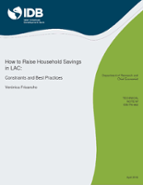How to Raise Household Savings in LAC: Constraints and Best Practices
Date
Apr 2016
This technical note examines demand-side constraints households in Latin America and the Caribbean face when making saving decisions, particularly households from lower income deciles. This emphasis is important because poverty can impact individuals' ability to process information, manage their time efficiently, or resist temptation, thus limiting their ability to make sound financial choices, forecast, or plan ahead. The note first reviews the main formal constraints on saving such as transaction costs, regulatory barriers and limited trust in financial systems. The note then considers constraints on saving in general, whether formal or informal, including social pressure, intra-household allocation issues, information and knowledge gaps, and behavioral biases when making financial choices. Reviewing advances in behavioral economics, particular emphasis is placed on how features of individual behavior can impact savings. Alleviating behavioral constraints could yield large welfare gains at relatively low costs.



